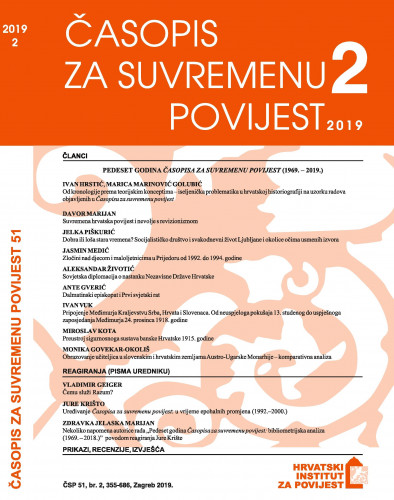U radu se razmatraju sjećanja na socijalizam i model konstrukcije socijalističke prošlosti u usmenim izvorima. Tražeći odgovor o organizaciji svakodnevnoga života, težište razmatranja bili su Ljubljana i njezino ruralno zaleđe. Nakon raspada Jugoslavije možemo pratiti različita sjećanja na socijalizam kao i poglede na to razdoblje. S jedne strane to je posljedica generacijskih razlika i životnih uvjeta koji su se promijenili tijekom desetljeća. Također su postojala različita iskustva stanovnika iz Ljubljane i onih iz ruralnoga zaleđa. Za prisjećanje su bili važni i drugi čimbenici: obitelj i njezino povijesno iskustvo, politička i svjetonazorska uvjerenja, javni diskursi te životne okolnosti u trenutku snimanja. Najveći dio sjećanja bio je posvećen poboljšanju životnoga standarda, području rada i rješavanju stambenoga pitanja.; This paper examines the memories of socialism and the model of constructing the socialist past in oral sources. Seeking answers regarding the organisation of everyday life, the focus of study was on Ljubljana and its rural surroundings. Presented here are the approaches to understanding everyday socialist life, the influence of various factors on memories of socialism, and the image of everyday socialist life in oral sources. Different life experiences were important in these recollections, as were other factors: family and its historical experience, political and world views, public discourses, and circumstances and discontent with the economic situation at the moment of recording. The time lapse from the end of socialism has freed the memories from former ideological frames, while the changed circumstances have prompted the creation of new myths. In their recollections, witnesses often compared and sought differences between past and present or stressed a different, i.e. unconventional, view of history. Socialism gradually introduced modernisation and urbanisation, changes in traditional roles and life, relative equality and social security, but also political and economic limitations. Public perception in the time of socialism was also influenced by the rising living standards. The sixties were a time of great changes in Ljubljana and its rural hinterland. Modernisation and new consumer goods gradually became present in urban and rural households, but there were great differences between them. The seventies brought the highest living standards since World War II and increased the quality of life of the entire population, while the gap between the urban and rural living standards and lifestyles became smaller. Based on oral sources, we can see that people were not greatly interested in politics, being more devoted to private life. The greatest part of their memories was devoted to improving living standards, their work, and resolving their housing problems.
Sažetak

 Časopis za suvremenu povijest : 51,2(2019) / glavni i odgovorni urednik, editor-in-chief Zdravka Jelaska Marijan.
Časopis za suvremenu povijest : 51,2(2019) / glavni i odgovorni urednik, editor-in-chief Zdravka Jelaska Marijan.